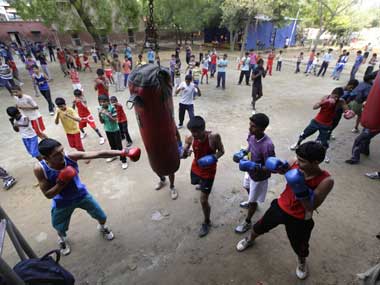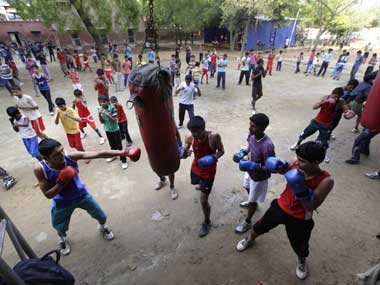By Shamya Dasgupta For the past many days, I have been signing in to Twitter, Google, Facebook, etc and typing ‘Bhiwani’ in the search box for entirely selfish reasons. Till about a week back, it was an ego-boosting exercise (my book was almost always right up there). But as the London Olympics are upon us, things have changed. ‘Bhiwani’ now throws up links to photo features by international publications of repute, articles by well-known writers. In time, before the London Olympic Games train leaves the station. Bhiwani. Of temples and booze shops and hospitals and boxing clubs, and hordes and hordes of buffaloes. The little town in Haryana that is now synonymous with Indian boxing. A trifle unfairly, perhaps, because athletes in other disciplines have also emerged from hereabouts and done well, but it is boxing that has put Bhiwani on the world map. Or, perhaps, I mean that Bhiwani has put Indian boxing on the world map? It’s hard to tell. It is a strange concatenation of events, people, and circumstances, even geography that brings us today to Bhiwani Junction. From the generation of Raj Kumar Sangwan, who belonged to the first batch of students to train under the legendary Hawa Singh (the two-time Asian champion, who was commissioned to head the Sports Authority of India centre in Bhiwani in the late 1980s), to youngsters like Vikas Krishan, it’s taken three generations to develop a local sporting culture. Kids growing up in Haryana in general and Bhiwani specifically can now look at boxing as a real – and lucrative – career option. [caption id=“attachment_388100” align=“alignleft” width=“380”]
 Bhiwani. Of temples and booze shops and hospitals and boxing clubs, and hordes and hordes of buffaloes. The little town in Haryana that is now synonymous with Indian boxing. AP[/caption] They call Bhiwani ‘Little Cuba’. That’s a bit of a stretch, but it is well-placed ambition. In the 2008 Olympics, we had five boxers in the fray, of which two – Vijender Singh and Dinesh Kumar – were from Bhiwani, and two more – Akhil Kumar and Jitender Kumar – had spent many of their formative years in Bhiwani. This time, of the seven men in contention, Vijender, Vikas Krishan, Jai Bhagwan, Manoj Kumar and Sumit Sangwan are all from Haryana. The first two – both Bhiwani-ites – are India’s only world championship medallists ever. Bhiwani’s pedigree, therefore, is unmatched in the Indian context. And Bhiwani knows what it has achieved. Everyone here knows the way to Vijender or Vikas’s residences, and they will even offer you a very sweet cup of tea and very sweet sweetmeats if you engage them in a chat about their favourite sport. Admittedly, most of their rhetoric isn’t grounded in technique, and you’ll hear things like ‘maar denge, koi bhi saamne aaya to dekh lenge’. But go to the fabled Bhiwani Boxing Club, run by Jagdish Singh, probably India’s most famous boxing coach, and you’ll see the other side of the story. Here, boxing is a way of life. My favourite story is about this bunch of young girls – 10 to14 years old – who have all come to Bhiwani from other parts of Haryana, and live together in an apartment (cooking, cleaning, the works) and train morning and evening to be boxers. Jagdish, and other coaches, are the pros, keeping tabs on developments in the outside world, coming up with plans and strategies, training the kids. Here, you hear things like “punch straight, only direct hits earn points” or “it’s all in the foot movement and your eyes, the hands are just the tool”. Motivation runs high in Bhiwani. The kids know that if they follow those instructions and put in good, hard work, there’s a big career round the corner. Earlier, a class IV job in one of the government departments was the end objective for many athletes. But today, in Haryana, you could become a Deputy Superintendent of Police if you reach the Olympic Games quarterfinals or win a medal at the world championships. Not everyone will get there, but a few might. In Bhiwani, everyone feels he or she could be one of the few. It took the achievements of Kapil Dev’s cricket team to turn the nation’s attention away from hockey in 1983. It took Viswanathan Anand’s grandmaster title in 1988 for close to 20 youngsters to emerge as chess superstars. Vijender, Akhil Kumar and the others, have already changed the landscape of Bhiwani, and Haryana. It’s something Dingko Singh or M.C. Mary Kom could have done for Manipur, if the political and economic climate were not so inhospitable. India’s not a ‘sporting, nation’ – yet. But who’s to say that a clutch of medals – I am betting on three or four – from the boxers in London won’t have an effect beyond Haryana? Haryana might become ‘Little Cuba’ yet, and India might yet learn to throw its punches properly. Shamya Dasgupta is Senior Editor, Wisden India and author of Bhiwani Junction — The Untold Story of Boxing in India, published by HarperCollins India in June 2012.
Bhiwani. Of temples and booze shops and hospitals and boxing clubs, and hordes and hordes of buffaloes. The little town in Haryana that is now synonymous with Indian boxing. AP[/caption] They call Bhiwani ‘Little Cuba’. That’s a bit of a stretch, but it is well-placed ambition. In the 2008 Olympics, we had five boxers in the fray, of which two – Vijender Singh and Dinesh Kumar – were from Bhiwani, and two more – Akhil Kumar and Jitender Kumar – had spent many of their formative years in Bhiwani. This time, of the seven men in contention, Vijender, Vikas Krishan, Jai Bhagwan, Manoj Kumar and Sumit Sangwan are all from Haryana. The first two – both Bhiwani-ites – are India’s only world championship medallists ever. Bhiwani’s pedigree, therefore, is unmatched in the Indian context. And Bhiwani knows what it has achieved. Everyone here knows the way to Vijender or Vikas’s residences, and they will even offer you a very sweet cup of tea and very sweet sweetmeats if you engage them in a chat about their favourite sport. Admittedly, most of their rhetoric isn’t grounded in technique, and you’ll hear things like ‘maar denge, koi bhi saamne aaya to dekh lenge’. But go to the fabled Bhiwani Boxing Club, run by Jagdish Singh, probably India’s most famous boxing coach, and you’ll see the other side of the story. Here, boxing is a way of life. My favourite story is about this bunch of young girls – 10 to14 years old – who have all come to Bhiwani from other parts of Haryana, and live together in an apartment (cooking, cleaning, the works) and train morning and evening to be boxers. Jagdish, and other coaches, are the pros, keeping tabs on developments in the outside world, coming up with plans and strategies, training the kids. Here, you hear things like “punch straight, only direct hits earn points” or “it’s all in the foot movement and your eyes, the hands are just the tool”. Motivation runs high in Bhiwani. The kids know that if they follow those instructions and put in good, hard work, there’s a big career round the corner. Earlier, a class IV job in one of the government departments was the end objective for many athletes. But today, in Haryana, you could become a Deputy Superintendent of Police if you reach the Olympic Games quarterfinals or win a medal at the world championships. Not everyone will get there, but a few might. In Bhiwani, everyone feels he or she could be one of the few. It took the achievements of Kapil Dev’s cricket team to turn the nation’s attention away from hockey in 1983. It took Viswanathan Anand’s grandmaster title in 1988 for close to 20 youngsters to emerge as chess superstars. Vijender, Akhil Kumar and the others, have already changed the landscape of Bhiwani, and Haryana. It’s something Dingko Singh or M.C. Mary Kom could have done for Manipur, if the political and economic climate were not so inhospitable. India’s not a ‘sporting, nation’ – yet. But who’s to say that a clutch of medals – I am betting on three or four – from the boxers in London won’t have an effect beyond Haryana? Haryana might become ‘Little Cuba’ yet, and India might yet learn to throw its punches properly. Shamya Dasgupta is Senior Editor, Wisden India and author of Bhiwani Junction — The Untold Story of Boxing in India, published by HarperCollins India in June 2012.
Can India's boxing revolution spread beyond Bhiwani?
FP Archives
• July 23, 2012, 21:28:50 IST
Who’s to say that a clutch of medals the boxers in London won’t have an effect beyond Haryana? Haryana might become ‘Little Cuba’ yet, and India might yet learn to throw its punches properly.
Advertisement
)